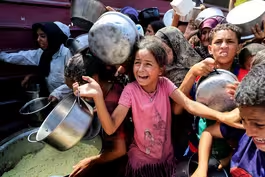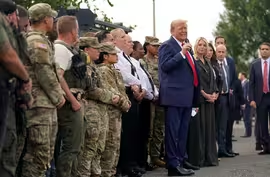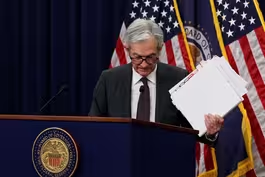
'Man-made disaster': Famine declared in Gaza City
Clip: 8/22/2025 | 7m 42sVideo has Closed Captions
'Man-made disaster': Famine declared in Gaza City where half a million face starvation
The international organization that monitors hunger crises around the world has declared that parts of Gaza are in famine. The U.N.-backed group of experts said that half a million people in Gaza, a quarter of the population, are facing “catastrophic conditions characterised by starvation, destitution and death.” Nick Schifrin spoke with David Miliband of the International Rescue Committee.
Problems playing video? | Closed Captioning Feedback
Problems playing video? | Closed Captioning Feedback
Major corporate funding for the PBS News Hour is provided by BDO, BNSF, Consumer Cellular, American Cruise Lines, and Raymond James. Funding for the PBS NewsHour Weekend is provided by...

'Man-made disaster': Famine declared in Gaza City
Clip: 8/22/2025 | 7m 42sVideo has Closed Captions
The international organization that monitors hunger crises around the world has declared that parts of Gaza are in famine. The U.N.-backed group of experts said that half a million people in Gaza, a quarter of the population, are facing “catastrophic conditions characterised by starvation, destitution and death.” Nick Schifrin spoke with David Miliband of the International Rescue Committee.
Problems playing video? | Closed Captioning Feedback
How to Watch PBS News Hour
PBS News Hour is available to stream on pbs.org and the free PBS App, available on iPhone, Apple TV, Android TV, Android smartphones, Amazon Fire TV, Amazon Fire Tablet, Roku, Samsung Smart TV, and Vizio.
Providing Support for PBS.org
Learn Moreabout PBS online sponsorshipGEOFF BENNETT: For the first time since the war in Gaza began, the international organization that monitors and categorizes hunger crises around the world has declared that parts of Gaza are in famine.
AMNA NAWAZ: The U.N.-backed group of international experts said today that half-a-million people in Gaza, one-quarter of the population, are facing -- quote -- "catastrophic conditions characterized by starvation, destitution and death."
And they warned that famine would spread within weeks without a cease-fire and a massive infusion of humanitarian aid into Gaza.
Nick Schifrin has more.
NICK SCHIFRIN: The experts group is called the Integrated Food Security Phase Classification, or IPC.
And it's concluded that, after 22 months of war, the half-a-million people living around Gaza City face famine.
You see that in purple stripes there.
Just below that, in bright red, one million people around Deir al Balah and Khan Yunis districts are one step below famine, meaning they face very high, acute malnutrition.
But the experts also said, by next month, those areas would also be in famine too.
North Gaza, you see at the top there, is in gray because the experts didn't have enough data, but warned conditions there were just as bad or worse.
And Rafah along the Egypt border in the south is white because Rafah is -- quote -- "depopulated."
U.N.
Emergency Relief Coordinator Tom Fletcher: TOM FLETCHER, United Nations Under-Secretary-General for Humanitarian Affairs and Emergency Relief Coordinator: It is a famine, the Gaza famine.
It is a famine that we could have prevented if we had been allowed.
Yet food stacks up at borders because of systematic obstruction by Israel.
It is a famine within a few hundred meters of food.
NICK SCHIFRIN: To discuss this more, we turn to David Miliband, president and CEO of the International Rescue Committee, which oversees humanitarian relief operations in more than 40 countries, as well as in Gaza.
He's also the former foreign secretary of the United Kingdom.
David Miliband, thanks very much.
Welcome back to the "News Hour."
The U.N. has been warning about famine conditions for a while now.
How significant is it that the experts of the IPC have now officially declared famine?
And what's unique about the IPC that gives it credibility?
DAVID MILIBAND, President, International Rescue Committee: Well, today is a horrible milestone marking a true moral and political scandal, because the IPC are a technical, technocratic, small-C conservative body that are very careful in determining the question of famine.
They have only declared three other famines in the whole of the 21st century, and they have to pass three very tough tests just to pick up the third test.
Two deaths per 10,000 people per day in Gaza means that 400 people a day are dying of starvation in Gaza.
And they do this work on the ground with reputable sources, with their own people, making sure that they are not taken away by rhetoric, but focus on the facts on the ground.
The fact that they should have declared this famine, this is what they call a manmade disaster of the famine in Gaza, carries extra significance because of the credibility and seriousness of which they do their work.
NICK SCHIFRIN: So zoom out for us.
The conditions in Gaza have been horrific for a while.
Why are they getting worse, especially around Gaza City, where the IPC declared today's famine?
DAVID MILIBAND: Well, I think there are simple reasons for explaining the dramatic deterioration.
There is the tourniquet that has been applied to aid flows.
The blockage on aid flows that was announced by Prime Minister Netanyahu in the middle of March has had its effect.
And in the previous reports of the IPC, they pointed to some of the dangers.
Of course, the war is ongoing, so that adds to the problem.
So, even for those families that have some beans, they can't cook them because they don't have cooking oil.
So the displacement that is associated with the ongoing fighting has contributed to that.
The destruction of agricultural land is part of the story too.
And, of course, the great fear is that actually things are far worse than they seem in the report, because all of the evidence from the past is that the IPC reports are a lagging indicator, not a leading indicator.
In the famine of 2011 in Somalia, 250,000 people were dead by the time that they declared famine.
And so the great fear is that the statistics are actually worse, the reality on the ground is worse than the statistics suggest.
NICK SCHIFRIN: And, as I pointed out, the IPC said it didn't even have data enough for North Gaza to determine the levels of hunger there.
You mentioned Israeli Prime Minister Benjamin Netanyahu.
He released a statement today that called the report -- quote -- "an outright lie.
Israel does not have a policy of starvation.
Israel has a policy of preventing starvation.
Since the beginning of the war, Israel has enabled two million tons of aid to enter the Gaza Strip."
And his statement goes on to accuse the IPC of ignoring Hamas' theft of humanitarian aid.
What's your response to his statement?
DAVID MILIBAND: We take very seriously the need to make sure that aid reaches those who require it.
And all of the evidence is that, when the system of nongovernmental organizations and the U.N. are allowed to do their work, they can reverse these trends.
In the period of the cease-fire in January, February and early March of this year, we saw that the way in which the aid was being delivered to the people who needed it, and it had an impact on the humanitarian conditions on the ground.
Since the return to fighting in the middle of March and the application of the blockade on aid flows, we have seen the reversal.
Month by month, things have got worse.
Even our own staff -- we have the teams on the ground recruited locally.
Even our own teams are suffering from lack of food and supplies.
We as an organization have over five tons of nutritional support and medical supplies stuck on the wrong side of the border.
And so the policy of the Israeli government is very clear.
It's to restrict aid.
And that has its consequence that you're seeing today.
NICK SCHIFRIN: And, just to be clear, those five tons that you say are stuck -- quote -- "on the wrong side of the border," you believe Israel is blocking that aid from entering Gaza?
DAVID MILIBAND: Well, they're stuck in the line.
There's no question about it at all.
We know that there are enormous quantities of aid waiting to be allowed across, but they're not being allowed across.
The only aid that's coming across is going to the so-called Gaza Humanitarian Foundation.
What you need to know about them is that, instead of having 400 distribution points, which is what the U.N. and NGO system had in the March 8 -- March-February period, there are four distribution points.
And as you have reported on your show, around 1,200 people have been killed in the vicinity of those distribution points because of the crush, because of the shooting that's been happening there.
So we have a well-proven system for mitigating the worst of war, but we're not allowing it to work in these circumstances.
NICK SCHIFRIN: And, finally, David Miliband, in the short time we have left, today's report also says that only a full-scale and sustained humanitarian aid program can prevent further loss of life.
What is necessary right now to prevent more famine?
DAVID MILIBAND: Well, we need a cease-fire to get the aid in, to get the hostages out.
That's obviously the immediate imperative.
But opening the taps, which is what the report calls for, is absolutely vital.
As soon as the aid is allowed in sufficient quantity, we will be able to get on with our work.
We have this well-proven system.
And we're desperate for the Israeli authorities to allow us to show again how it can work well.
NICK SCHIFRIN: David Miliband, president and CEO of the International Rescue Committee, thank you very much.
Capehart and Ponnuru on the FBI's raid on John Bolton
Video has Closed Captions
Clip: 8/22/2025 | 11m 51s | Capehart and Ponnuru on the FBI's raid on Trump critic John Bolton (11m 51s)
FBI raids John Bolton, former Trump adviser turned critic
Video has Closed Captions
Clip: 8/22/2025 | 6m 50s | FBI raids home of John Bolton, a former Trump adviser turned vocal critic (6m 50s)
Life in Gaza, through the voices of its children
Video has Closed Captions
Clip: 8/22/2025 | 6m 18s | A glimpse of life in Gaza, through the voices of its children (6m 18s)
News Wrap: Pentagon says troops will carry firearms in D.C.
Video has Closed Captions
Clip: 8/22/2025 | 6m 22s | News Wrap: Pentagon says troops will start carrying firearms in D.C. (6m 22s)
Pastor leading Target boycott on the retailer's response
Video has Closed Captions
Clip: 8/22/2025 | 6m 11s | Pastor leading Target boycott on its impact and the retailer's response (6m 11s)
Powell hints at rate cut, but Fed in 'challenging situation'
Video has Closed Captions
Clip: 8/22/2025 | 7m | Powell hints at long-awaited rate cut but admits Fed in 'challenging situation' (7m)
Providing Support for PBS.org
Learn Moreabout PBS online sponsorship
- News and Public Affairs

FRONTLINE is investigative journalism that questions, explains and changes our world.

- News and Public Affairs

Amanpour and Company features conversations with leaders and decision makers.












Support for PBS provided by:
Major corporate funding for the PBS News Hour is provided by BDO, BNSF, Consumer Cellular, American Cruise Lines, and Raymond James. Funding for the PBS NewsHour Weekend is provided by...





